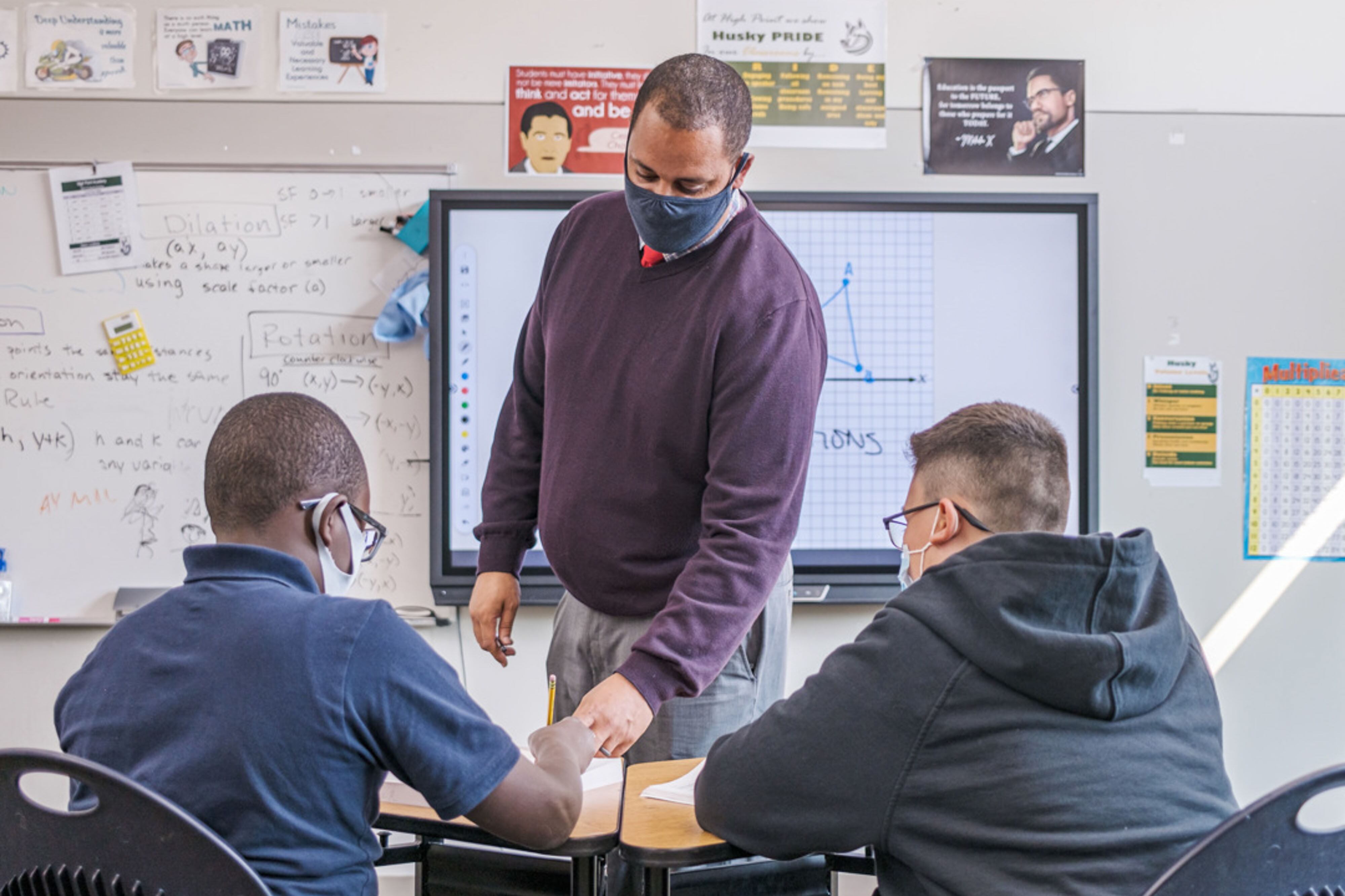A math teacher who grew up in northeast Denver and has long coached youth sports in the region is running to represent it on the Denver school board.
Gene Fashaw is an eighth grade math teacher at High Point Academy charter school in Aurora. He lives in the nearby Green Valley Ranch neighborhood of far northeast Denver, and his two children attend the school. Before working at High Point, Fashaw was a math teacher at STRIVE Prep Montbello, a Denver charter school just 6 miles away.
Fashaw, 37, attended Denver Public Schools as a child and graduated from George Washington High School. He said he’s running for school board because he wants to steer the district toward supporting students he said are “often forgotten and not served appropriately.”
Instead of viewing Black and Hispanic students through a deficit lens, he said, the district needs to provide “every opportunity for our kids to be successful in the neighborhoods that they live in. They shouldn’t have to drive across town just to get a good education.”
In all, 12 candidates are running for four open seats in the Nov. 2 election. The winners will oversee a new superintendent, craft a new strategic plan, and grapple with several long-simmering issues, including declining enrollment and continued disagreement over the role of independent charter schools and semi-autonomous innovation schools.
Fashaw went to elementary school in the Montbello neighborhood, then was bused to middle and high schools in other parts of the city to attend magnet and gifted and talented programs. He got his undergraduate degree from Morehouse College, a historically Black college in Atlanta, and worked for many years for the city of Denver. His last city job was as a supervisor with the department that provides cash assistance to families in need.
In 2017, he got a fellowship through Teach for America, a program that trains educators on the job. He wanted to switch careers and become a teacher, and he said Teach for America gave him an opportunity to earn a master’s degree through the Relay Graduate School of Education and then to teach at a charter school in Montbello. Fashaw has since earned a second master’s degree in biotechnology from the Morehouse School of Medicine.
At the time he took the fellowship, Fashaw said he was looking for a way into the classroom, not making a political statement. Charter schools and Teach for America are often associated with the education reform movement, which is opposed by teachers unions.
“I was just an employee that wanted to teach,” Fashaw said. “It’s really easy to typecast somebody because of where they work or how they got their opportunity instead of focusing on the character of who they are and the work that they’ve done.”
At STRIVE Prep Montbello, Fashaw said he held his students, nearly all of whom were Black and Hispanic, to high expectations. He taught there until this year, when he took the job at High Point, outside the district. School board policy bars Denver school employees from serving on the board.
If elected, Fashaw said he’d direct the district to better recruit and retain teachers of color. He’d also prioritize amplifying the community’s voice in district decision-making, he said, such as the recent board vote to reopen the shuttered Montbello High School next fall.
Fashaw said he supports the move, which community members advocated for. However, he pleaded with the board not to displace STRIVE Prep Montbello, which is located inside the former Montbello High. The board ultimately voted to move STRIVE to another campus.
“I feel like there were still some voices that did not get heard in that process,” he said. “As a board member, I want to make sure I’m holding regular meetings with the community.”
Denver Public Schools is Colorado’s largest school district, serving about 90,000 students. A little more than half of students are Hispanic, 26% are white, and 14% are Black. Its school board has seven members — five regional and two districtwide.
The northeast part of Denver Fashaw is vying to represent stretches from Five Points to the Green Valley Ranch and Gateway neighborhoods.
We asked him about several key issues the district will face in the coming years.
Declining enrollment and a growing number of small schools: Far northeast Denver is one of the few parts of the city where enrollment is expected to increase in coming years as more housing is built on open land. However, Fashaw said the district still needs to look into why some students leave for private schools or public schools in neighboring districts.
“Some of that declining enrollment can be stemmed a little bit,” he said. “Thinking about more of a business mindset: create a product that people want and they’ll come to it.”
In neighborhoods with declining enrollment, Fashaw said school closure should be a last resort.
Charter and innovation schools: Fashaw acknowledged the controversial history of charter and innovation schools in Denver, but he said that now that they’re here, what’s needed is “people inside … these charters that are willing to do the work.”
“They have to be committed to serving students appropriately,” he said. “Going back to culturally sustaining environments, making sure that we’re not coming from places of deficit, making sure that we’re challenging every student to be their best and holding them to high expectations … and teaching them that college is not the only thing that you need to have.”
Improving education for Black students: Codifying goals on paper, such as the board’s 2019 Black Excellence resolution, is a first step, Fashaw said. What matters next, he said, is how individual schools put the requirements into action.
“We have pockets of success but we need the entire district to be successful in that, whether [a school has] a large Black student population or not,” he said.






